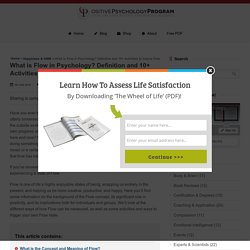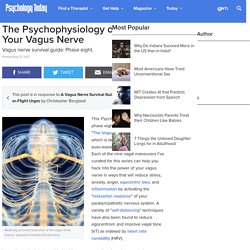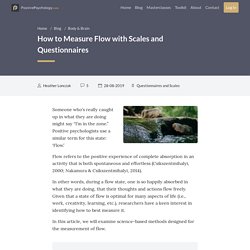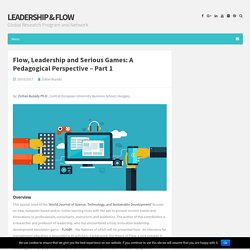

What is Flow in Psychology? Home » Happiness & SWB » What is Flow in Psychology?

Definition and 10+ Activities to Induce Flow Have you ever been completely and utterly immersed in a task? Oblivious to the outside world, focused only on your own progress and what’s going on right here and now? Maybe you’ve been doing something you love, like playing music or a certain sport, before realizing that time has totally passed you by? If you’ve answered yes to any of these questions, it’s likely that you’ve been experiencing a state of Flow. Flow, the secret to happiness [ TED Talk : Mihaly Csikszentmihalyi ] From Helplessness to Empowerment Via The Flow Channel. When Martin Seligman, now recognized as the father of positive psychology, first began experimenting, he was hoping uncover the then elusive etiology of depression.

By placing dogs in a condition similar to what a depressed person might feel – they were placed in harnesses and then delivered an inescapable shock – and then placing the same dogs in a situation where escape was possible, Seligman was hoping to better understand why some depressed people seemed to resist efforts to get better – even when they were right in front of them. As a control, Seligman put some dogs in the harnesses, and then delivered no shock – Group One. Group Two dogs were placed in the harnesses and delivered a shock which they could escape by placing a lever. Group Three dogs, however, were yoked to Group Two dogs, and when a Group Two dog got a shock, so did a Group Three dog. The only difference was that Group Three dogs’ lever didn’t stop the shock.
The Psychophysiology of Flow and Your Vagus Nerve. Medically accurate illustration of the vagus nerve.

Source: Sebastian Kaulitzki/Shutterstock This Psychology Today blog post is phase eight of a nine-part series called "The Vagus Nerve Survival Guide" which is designed to help you stay even-keeled in a topsy-turvy world. Each of the nine vagal maneuvers I've curated for this series can help you hack into the power of your vagus nerve in ways that will reduce stress, anxiety, anger, egocentric bias, and inflammation by activating the "relaxation response" of your parasympathetic nervous system.
A variety of "self-distancing" techniques have also been found to reduce egocentrism and improve vagal tone (VT) as indexed by heart rate variability (HRV). article continues after advertisement Interestingly, the latest empirical evidence suggests that there is a correlation between parasympathetic engagement of the vagus nerve and creating a "flow state. " Source: Wikimedia Commons/Public Domain Source: Photo by Christopher Bergland. Curiosity. Learning. Passions. Challenge.
In The Zone.
The Athlete's Way. Nature. Artificial Flow. Want More Flow In Your Life? Here Are Four Ways. You’ve heard of the state of flow. Its when time stops, you become completely immersed in what you are doing, and you feel as if your actions and awareness merge perfectly, making the task seem almost effortless. And while flow comes with a host of benefits — from improved mood, concentration, immune function, awareness, and response to stress — it can be a very elusive state, and for that reason, hard to tap into. So how do we reach this enviable state? Here are four ways. Employ Novelty As novel situations tend to peak curiosity, they are also natural gateways into flow. So how do we use novelty to drive flow? Get Outdoors Most people can relate to feeling better when spending time outside. But nature also offers an essential key to promoting flow – that is the self- transcendent experience.
So how do we utilize nature to induce flow? Spend Time With Animals. How to Measure Flow with Scales and Questionnaires. Someone who’s really caught up in what they are doing might say “I’m in the zone.”

Positive psychologists use a similar term for this state: ‘Flow.’
Dunning Kruger Effect. Positive Organizational Psychology. Flow, Leadership and Serious Games: A Pedagogical Perspective. By: Zoltan Buzady Ph.D., Central European University Business School, Hungary.

Overview This special issue of the ‘World Journal of Science, Technology, and Sustainable Development’ focuses on new, computer-based and/or online learning tools with the aim to present current trends and innovations to professionals, consultants, instructors, and academics. The author of this contribution is a researcher and professor of leadership, who has encountered a truly innovative leadership development simulation game – FLIGBY – the features of which will be presented here. Its relevance for management education is grounded in its scholarly background: the theory of Flow, a core concept in positive psychology. Its relevance for practitioners in management and training is rooted in the way this serious game helps players to transpose abstract, theoretical concepts into daily management practices.